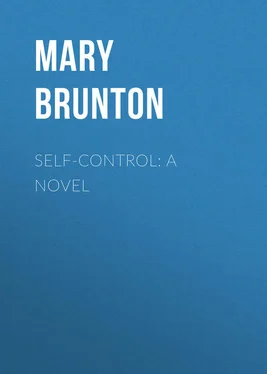Mary Brunton - Self-control - A Novel
Здесь есть возможность читать онлайн «Mary Brunton - Self-control - A Novel» — ознакомительный отрывок электронной книги совершенно бесплатно, а после прочтения отрывка купить полную версию. В некоторых случаях можно слушать аудио, скачать через торрент в формате fb2 и присутствует краткое содержание. ISBN: , Жанр: foreign_antique, foreign_prose, на английском языке. Описание произведения, (предисловие) а так же отзывы посетителей доступны на портале библиотеки ЛибКат.
- Название:Self-control: A Novel
- Автор:
- Жанр:
- Год:неизвестен
- ISBN:http://www.gutenberg.org/ebooks/41196
- Рейтинг книги:5 / 5. Голосов: 1
-
Избранное:Добавить в избранное
- Отзывы:
-
Ваша оценка:
- 100
- 1
- 2
- 3
- 4
- 5
Self-control: A Novel: краткое содержание, описание и аннотация
Предлагаем к чтению аннотацию, описание, краткое содержание или предисловие (зависит от того, что написал сам автор книги «Self-control: A Novel»). Если вы не нашли необходимую информацию о книге — напишите в комментариях, мы постараемся отыскать её.
Self-control: A Novel — читать онлайн ознакомительный отрывок
Ниже представлен текст книги, разбитый по страницам. Система сохранения места последней прочитанной страницы, позволяет с удобством читать онлайн бесплатно книгу «Self-control: A Novel», без необходимости каждый раз заново искать на чём Вы остановились. Поставьте закладку, и сможете в любой момент перейти на страницу, на которой закончили чтение.
Интервал:
Закладка:
'Dearest Laura, bound by your charms, allured by your example, my reformation would be certain, my virtue secure.'
'Oh, hope it not! – Familiar with my form, my only hold on your regard, you would neglect, forsake, despise me; and who should say that my punishment was not just.'
'And will you then,' cried Hargrave, in an agony; 'Will you then cut me off forever? Will you drive me for ever from your heart?'
'I have now no choice – leave me – forget me – seek some woman less fastidious; or rather endeavour, by your virtues, to deserve one superior far. Then honoured, beloved, as a husband, as a father' – The fortitude of Laura failed before the picture of her fancy, and she was unable to proceed. Determined to conceal her weakness from Hargrave, she broke from him, and hurried towards the door; – but, melting into tenderness at the thought that this interview was perhaps the last, she turned. 'Oh, Hargrave,' she cried, clasping her hands as in supplication, 'have pity on yourself – have pity on me – forsake the fatal path on which you have entered, that, though for ever torn from you here, I may yet meet you in a better world.'
She then darted from the room, leaving her lover in dumb amazement, at the conclusion of an interview so different from his expectations. For the resentment of Laura he had been prepared; but upon her determined refusal, he had never calculated, and scarcely could he now admit the reality. Could he give her credit for the professed motive of her rejection? Colonel Hargrave had nothing in himself that made it natural for him to suppose passion sacrificed to reason and principle. Had he then deceived himself, – had she never really loved him? – the suggestion was too mortifying to be admitted. Had resentment given rise to her determination? She had spoken from the first with calmness, – at last with tenderness. Was all this but a scene of coquetry, designed to enhance her favours? The simple, the noble, the candid Laura guilty of coquetry? – impossible! While these thoughts darted with confused rapidity through his mind, one idea alone was distinct and permanent – Laura had rejected him. This thought was torture. Strong resentment mingled with his anguish; and to inflict, on the innocent cause of it, pangs answering to those he felt, would have afforded to Hargrave the highest gratification. Though his passion for Laura was the most ardent of which he was capable, its effects, for the present, more resembled those of the bitterest hatred. That she loved him, he would not allow himself to doubt; and, therefore, he concluded that neglect would inflict the surest, as well as the most painful wound. Swearing that he would make her feel it at her heart's core, he left the cottage, strode to the village inn, surlily ordered his horses, and, in a humour compounded of revenge, impatient passion, and wounded pride, returned to his quarters at – . His scheme of revenge had all the success that such schemes usually have or deserve; and while, for one whole week, he deigned not, by visit or letter, to notice his mistress, the real suffering which he inflicted, did not exactly fall on her for whom he intended the pain.
CHAPTER III
To an interview which he presumed would be as delightful as interesting, Captain Montreville chose to give no interruption; and therefore he had walked out to superintend his hay-making: But, after staying abroad for two hours, which he judged a reasonable length for a tête-à-tête, he returned, and was a little surprised to find that the Colonel was gone. Though he entertained not a doubt of the issue of the conference, he had some curiosity to know the particulars, and summoned Laura to communicate them.
'Well, my love,' said he, as the conscious Laura shut the parlour door, 'is Colonel Hargrave gone?'
'Long ago, Sir.'
'I thought he would have waited my return.'
Laura made no answer.
'When are we to see him again?'
Laura did not know.
'Well, well,' said Captain Montreville, a little impatiently, 'since the Colonel is gone without talking to me, I must just hear from you what it is you have both determined on.'
Laura trembled in every limb. 'I knew,' said she, without venturing to lift her eye, 'that you would never sacrifice your child to rank or fortune; and therefore I had no hesitation in refusing Colonel Hargrave.'
Captain Montreville started back with astonishment, – 'Refuse Colonel Hargrave?' cried he, – 'Impossible – you cannot be in earnest.'
Laura, with much truth, assured him that she never in her life had been more serious.
Captain Montreville was thunderstruck. Surprise for a few moments kept him silent. At last recovering himself, – 'Why, Laura,' said he, 'what objection could you possibly make to Hargrave? – he is young, handsome, accomplished, and has shewn such generosity in his choice of you' —
'Generosity! Sir,' repeated Laura.
'Yes; it was generous in Colonel Hargrave, who might pretend to the first woman in the kingdom, to think of offering to share his fortune and his rank with you, who have neither.'
Laura's sentiments on this subject did not exactly coincide with her father's, but she remained silent while he continued: 'I think I have a right to hear your objections, for I am entirely at a loss to guess them. I don't indeed know a fault Hargrave has, except perhaps a few gallantries; which most girls of your age think a very pardonable error.'
A sickness, as of death, seized Laura; but she answered steadily, 'Indeed, Sir, the Colonel's views are so different from mine – his dispositions so very unlike – so opposite, that nothing but unhappiness could possibly result from such an union. But,' added she, forcing a languid smile, 'we shall, if you please, discuss all this to-morrow; for, indeed, today, I am unable to defend my own case with you. I have been indisposed all day.'
Captain Montreville looked at Laura, and, in the alarm which her unusual paleness excited, lost all sense of the disappointment she had just caused him. He threw his arm tenderly round her – supported her to her own apartment – begged she would try to rest, – ran to seek a cordial for his darling; and then, fearing that the dread of his displeasure should add to her disorder, hastened back to assure her that, though her happiness was his dearest concern, he never meant to interfere with her judgment of the means by which it was to be promoted.
Tears of affectionate gratitude burst from the eyes of Laura. 'My dear kind father,' she cried, 'let me love – let me please you – and I ask no other earthly happiness.'
Captain Montreville then left her to rest; and, quite exhausted with illness, fatigue, and sorrow, she slept soundly for many hours.
The Captain spent most of the evening ruminating on the occurrence of the day; nor did his meditations at all diminish his surprize at his daughter's unaccountable rejection of his favourite. He recollected many instances in which he thought he had perceived her partiality to the Colonel; – he perplexed himself in vain to reconcile them with her present behaviour. He was compelled at last to defer his conclusions till Laura herself should solve the difficulty. The subject was, indeed, so vexatious to him, that he longed to have his curiosity satisfied, in order finally to dismiss the affair from his mind.
Laura had long been accustomed, when assailed by any adverse circumstance, whether more trivial or more important, to seize the first opportunity of calmly considering how far she had herself contributed to the disaster; and, as nothing is more hostile to good humour than an ill-defined feeling of self-reproach, the habit was no less useful to the regulation of our heroine's temper, than to her improvement in the rarer virtues of prudence and candour. Her first waking hour, except that which was uniformly dedicated to a more sacred purpose, she now employed in strict and impartial self-examination. She endeavoured to call to mind every part of her behaviour to Colonel Hargrave, lest her own conduct might have seemed to countenance his presumption. But in vain. She could not recall a word, a look, even a thought, that could have encouraged his profligacy. 'Yet why should I wonder,' she exclaimed, 'if he expected that temptation might seduce, or weakness betray me, since he knew me fallible, and of the Power by which I am upheld he thought not.'
Читать дальшеИнтервал:
Закладка:
Похожие книги на «Self-control: A Novel»
Представляем Вашему вниманию похожие книги на «Self-control: A Novel» списком для выбора. Мы отобрали схожую по названию и смыслу литературу в надежде предоставить читателям больше вариантов отыскать новые, интересные, ещё непрочитанные произведения.
Обсуждение, отзывы о книге «Self-control: A Novel» и просто собственные мнения читателей. Оставьте ваши комментарии, напишите, что Вы думаете о произведении, его смысле или главных героях. Укажите что конкретно понравилось, а что нет, и почему Вы так считаете.












